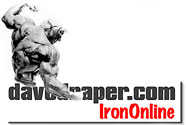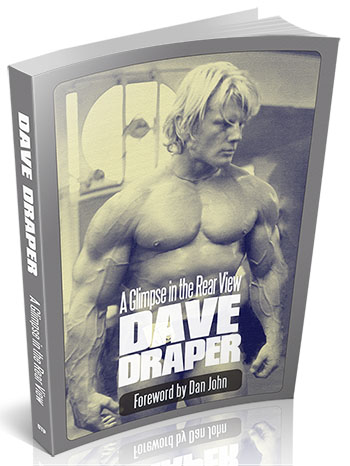What I Told Him

Download the full Draper here newsletter
in printable, live-link, pdf format, here.
From an old Bodybuilding.com interview (2004), here’s something Laree dredged up and thought you might want to see. The interviewer was David Robson. It’s a bit long, but brevity can sound terse, leave things unsaid and offer no entertainment. Truth is, I talk too much when I write. And away we go...
Q. Dave, you are one of bodybuilding’s greats. When you began bodybuilding, did you have any idea, at the time, that you would go on to win the Mr. America, Mr. World and Mr. Universe titles and essentially set the standard for the Arnolds and Ronnies of this world? What were your intentions at the time?
A. Me? Mr. America and a “standard setter?” In a word, no. To elaborate, I hadn’t a clue. I was a 20-year-old welder in a factory snuggled in the swampy meadows of New Jersey, 30 minutes from cozy Newark. Swell place to swat mosquitoes in the summer and unbury your car from snow in the winter and raise my then-six-month-old daughter.
One day, while picking up a pair of 45-pound plates at Weider Barbell Company in neighboring Union City, Joe Weider offered me a job at his new California outlet in Santa Monica. Visions of bright sunshine and blue skies and clean, clear water filled my imagination. Six weeks later my imagination became a reality.
My intentions were to make it from one day to the next, train and work and learn and grow and grow up with my family. Ambition wasn’t absent. It was wrapped up in survival and always has been. Thank God for hard work, determination and perseverance. Thank God for God. My life mostly happened. I learned how to put one step before the other by noticing with acumen where the last step had been. Still do. I call this singular methodology “learning from my mistakes.”
Q. What year did you begin training and was there anything that inspired you to make this decision?
A. I was chinning and dipping and doing pushups before I was 10. I had a small heap of weights that I kept under my bed before I was a teen. The set grew in size as my interest increased and my back strengthened and widened. In recollection it’s clear that no one inspired me and there was no decision. One day I was lifting weights, or whatever you might call the vicious little battles in which the iron and I engaged.
Like riding a bike, my skill developed day to day. Presto change-o!
Q. At the peak of your career, what was your bodyweight and what were your measurements?
I was 235 pounds at six feet. Those were the only measurements that interested me. The rest I considered troublesome, pointless, distracting and excessively attentive.
Q. Your arms were particularly massive and symmetrical. Did you place a special emphasis on arm training or were you genetically gifted in this area?
A. The only genetic gifts to which I am predisposed is that I am not under six feet tall nor of a narrow shoulder or wide hip structure. My arms were buggy whips before the Ironage, my chest a peanut shell.
Q. What do you consider to be your main strengths and weaknesses?
A. Forearms and calves, in that order. Just kidding.
Weaknesses I have in abundance and we won’t discuss them here or you’ll think I’m bragging. Well, okay, one: I’m selfish.
Strengths? Let’s see; it’s not my memory, my disposition, my musical skills (none), my rugged good looks, my ability to pole vault or jump hurdles; not international peacemaking, I don’t play golf or tennis. Can we come back to this one another time?
Q. Describe your bodybuilding competition diet. How does this diet compare to what you eat today?
A. Here I shine, as brightly as a tarnished relic might. I follow the high-protein, medium-carb, medium-fat, no-fad bodybuilding diet. I ingest quantities of lean red meat, followed by fish and poultry and backed sufficiently by milk products and eggs. I fortify the menu with lots of fresh vegetables and enough fruit for all the good reasons -- carbs, vitamins and minerals, phyto-nutrients, enzymes and roughage. I add grains and nuts for some fun and nutritional needs, and avoid sugar and salt and weird chemicals.
The eating is divided into six agreeable meals throughout the day, as needed. Lots of water and probably too many supplements fill in the spaces.
This has been my year-round eating scheme for over 40 years. And the last 10 years, I’ve observed, are tighter and more in-tune than ever. Thanks to habit, preference and the fact that it works, sprinkled with discipline and fear.
Pre-contest would have me tuning in training and food choices and quantities over the last weeks. For example: The milk would go first, then fish took a primary position over the red meat, and the high-glycemic carbs leave the table.
Q. Are you still a big fan of bodybuilding? What is your involvement in bodybuilding today? In what ways do you feel it has changed since the 50s 60s and 70s?
Please forgive me when I make the following odd admission. Better yet, understand from whence I come... I have a hunch I’m not entirely alone. I’ve never been a fan of bodybuilding. In 1960, when I was seventeen, I picked up my first muscle magazine and was introduced to the term “bodybuilder.” I already had an almost 17-inch arm at 175. I cringed. I was a weightlifter, a builder of muscle and strength for everyday function, for respect, for challenge and for fun. Sweeping muscles in briefs on stage before gapping eyes was of no interest to me. “Good for them, not for me,” I thought.
Furthermore, talking about muscles, I thought, was absurd. Building muscle and might was something you did, not read about, gossiped about or studied. Where’s the weights? I was an ironhead, a musclehead, but not a bodybuilder.
I became part of the bodybuilding scene -- secretly known to me as the weightlifting scene -- during the 60s, when it was a raw and roaring young lion. Gee whiz, the music, the lights, the posing, the oil, the pumping up, the enthusiastic crowd beyond the front row, the winning and losing was an enormous experience, and the guys were the best. We felt like cowboys. The magazines and the gossip and the covers and the tall stories and legitimate fame in a sub-culture were and still are terrific.
I was visitor, an honorary citizen, who exited the same way he came in, via an unlocked but slightly jammed side door, down the dark and littered alley of a crumbling red-brick building.
I won my first contest, Mr. New Jersey, over 40 years ago in 1963 and have lifted steadily since, missing time only for injury repair or illness here and there along the way.
Q. What do you consider to be the greatest achievement of your bodybuilding career?
The greatest achievement for me is having a unique place in its history -- one of the rat pack of the Golden Era of Bodybuilding, the when, where and who of the incredible endeavor.
Q. If you could give one piece of advice to an aspiring bodybuilder, what would it be?
If you’re gonna smoke, use a charcoal filter. Another dark joke...
Be consistent.
But wait, there’s more! Train hard, never give up, eat right, stick to the basics, don’t be so dern doubtful and stop worrying; it’s all good if you do it with your heart ’cuz you’ll learn to separate the good from the bad as you persist, which reminds me: persist, persevere, endure and fight like a bulldog.
Draw on your desire and be enthusiastic and positive and cool, man. Oh, yeah! Don’t listen to the hype. It gets thick and heavy.
Finally, you’ve got to love this stuff.
Well, this ended up being longer than expected, so we’ll finish up HERE.
dd
*****
Take a trip over to our
Musclebuilding Q&A Blog
... where Dave allows us a peek into his email outbox.
Did you sign up for Dave's expanded email yet?
It's free, motivating and priceless!
We'll also send you a link to Dave's free
Body Revival Tips and Hints e-report with your confirmation notice.

